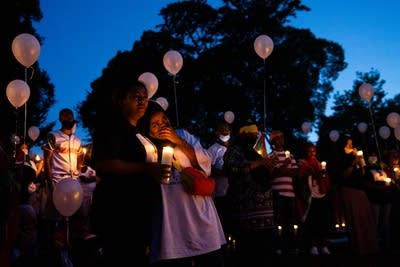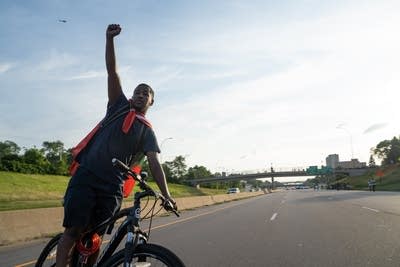Twin Cities Oromo community mourns cultural icon, takes up his song

Go Deeper.
Create an account or log in to save stories.
Like this?
Thanks for liking this story! We have added it to a list of your favorite stories.
At a candlelight vigil in Minneapolis Thursday night, Fatuma Bedhaso spoke to the community about raising their voices to fill the void left by the death of Hachalu Hundessa.
“Hachalu deserves so much from us, because he gave so much to us,” Bedhaso said. “And he gave us the luxury of waiting for him to speak up for us. For Hachalu, I will speak until the day I die. Until justice is served and until my people can live in dignity and won’t have to fight.”
At 34, Hundessa was revered as both a civil rights revolutionary and a towering musical figure in Ethiopia. According to news reports, he was shot and killed Monday night in Addis Ababa, by, according to The New York Times, “unknown assailants.”
His death has sparked unrest in Ethiopia, and dozens of protesters have died in clashes with security forces.
Turn Up Your Support
MPR News helps you turn down the noise and build shared understanding. Turn up your support for this public resource and keep trusted journalism accessible to all.
Hundessa’s death has become personal to many Oromo in the Twin Cities — where grieving for him has turned into a call to action. At the vigil on Thursday, Bedhaso called for people to take to social media and keep Hundessa’s name trending, and to post about their protests until officials take notice.
Now, Bedhaso said, it’s the community’s turn to take up the work the Oromo icon began on behalf of his people, the ethnic group that makes up nearly a third of Ethiopia’s population, but who have historically been oppressed and shut out of politics, until the election of Prime Minister Abiy Ahmed in 2018.
Ahmed’s government has cut off internet access, leaving many in the Oromo and Ethiopian diaspora unable to communicate with their families back home. The only connection has come from unstable phone lines, which people say are hard to hear and often drop the calls.
Ahmed won a Nobel Peace Prize last year, but many Oromo people around the world are now calling for him to step down.
In St. Paul on Wednesday evening, a crowd of roughly 200, carrying Oromo flags — red and green stripes, with a spiked gold circle, green tree and green star in the middle — and signs, wearing T-shirts and holding umbrellas against the summer sun, took to the streets.
Magarsa Tashoma wore an Oromo flag as a cape, riding his bike ahead of the protest as it blocked traffic on Interstate 94.
“When they took him away from us, they took a father figure,” Tashoma said.“His death hit me [as if] my own dad died. I will never forget that, I promise you that. I will never forget him.”
The Twin Cities’ Oromo community has hosted marches and vigils since Hachalu’s death early this week. Community members are raising their voices to be recognized, Aisha Ali said. She joined the crowd on the interstate Wednesday.
“Outside of Oromia, our homeland in the horn of Africa, this is the largest diaspora Oromo community,” she said. “It’s also known as Little Oromia.”
But in Minnesota, Ali said, the Oromo community is largely misunderstood.
“A lot of the locals don’t even know who the Oromo people are. They’ll either label you as Ethiopian or as Somali,” she said. “Shutting down the highway is not about breaking the law, it’s just about sharing our grievances and our frustrations, and letting the world know — because this is beyond Minnesota — letting the world know who the Oromo people are.”
The protests and vigils, she said, have been a place to grieve and to bring attention to the plight of the Oromo people — “We are here. We are vocal, we stand for our people, we are resilient,” she said — as they celebrate Hundessa’s life, and raise his voice together.









